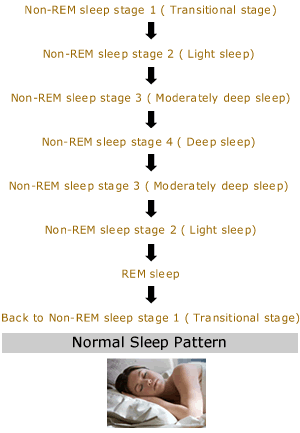Sleeping Difficulties:Tips To avoid Sleeplessness
An average person spends about one-third of his life sleeping. Normally people (adults) require about 6-9 hours of sound sleep to function well but some people can do very well even with 4-5 hours of sleep. It must be understood that the quantity of sleep is not the prime requirement. It is the quality of 'restfulness' that is more important.
Infants require much more sleep as compared to adults and they can sleep for up to 18 hours a day (average between 16- 20 hours). By the time they are 3-6 months old, they require about 15 hours of sleep. Children older than this require about 10-13 hours of sleep daily. Pre-teens and teenagers require anywhere between 9-10 hours of sleep.
As age advances above 50 years, the sleep duration reduces to about 5 ½ to 6 hours at night.
Normal sleep is of two types:
- Slow-wave (non-REM) sleep
- Rapid eye movement (REM) sleep
Slow-wave (non-REM) sleep:
Non-REM sleep lasts about 70-90 minutes. It has four stages as follows:
- Transitional stage (lasting about 1-7 minutes)
- Light sleep
- Moderately deep sleep (about 20 min after falling asleep)
- Deep sleep
Rapid eye movement (REM) sleep:
- This is a very important stage of sleep
- It usually occurs within 50-90 minutes of falling asleep
- Initially lasts 5-10 minutes; gradually this stage lengthens until the final REM period lasts 50 minutes
- Most dreaming occurs during this phase of sleep
- The eyeballs of a sleeping person will make rapid side-to-side movements under the lids during REM sleep
- The muscles of the body are very relaxed during this phase of sleep
- REM sleep is particularly useful for the growth and repair of the brain itself, while non-REM sleep is useful for the repair of the rest of the body
Normal Sleep Pattern:
REM sleep and non-REM sleep alternate with each other during the normal sleep pattern. The cycle has been illustrated below:

This entire cycle repeats itself about 3-5 times during the entire night. Each cycle lasts for about 90 minutes. About 50% of an infant's sleep is constituted by REM sleep and about 20% of an adult's sleep is constituted by REM sleep.
Why is sleep important?
Having enough quality sleep is vital to the emotional and physical well-being of a person and hence all the importance given to sleep is justified.
Sleep patterns:
Sleep patterns may vary from person to person. Some people are comfortable going to sleep early and waking up early. Others may be late sleepers and used to pushing off late from the bed in the morning. Then there are also some kinds of people who may be used to taking regular naps during the daytime whereas others may not feel the need for this at all.
Written & Approved by-
Dr. Rajesh Shah
M.D. (Hom.)